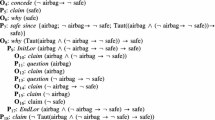Abstract
In this paper we show how dialogue-based theories of argumentation can contribute to the construction of effective systems of dispute resolution. Specifically we consider the role of persuasion in online dispute resolution by showing how persuasion dialogues can be functionally embedded in negotiation dialogues, and how negotiation dialogues can shift to persuasion dialogues. We conclude with some remarks on how persuasion dialogues might be modelled is such a way as to allow them to be implemented in a mechanical or computerized system of dialogue or dialogue management.
Similar content being viewed by others
References
Bench-Capon T. J. M. (2002). Agreeing to Differ: Persuasive Dialogue Between Parties with Different Values. Informal Logic 22:231–245
Craver C. (1994). Effective Legal Negotiation and Settlement. Michie Co.: Charlottesville, VA
Eemeren F. H. van and Grootendorst R. (1984). Speech Acts in Communicative Discussions. Dordrecht, Foris
Eemeren F. H. van and Grootendorst R. (1987). Fallacies in Pragma-Dialectical Perspective. Argumentation 1:283–301
Eemeren F.H. van and Grootendorst R. (1992). Argumentation, Communication and Fallacies. Hillsdale, NJ, Erlbaum
Goldberg S., Sander F. and Roberts N. (1992). Dispute Resolution, Negotiation, Mediation and Other Processes. Boston, Little Brown and Company
Grice, Paul. ([1967] 1989). Logic and Conversation. In Studies in the Way of Words, 22–40. Harvard University Press: Cambridge, MA.
Hamblin C. L. (1970). Fallacies. London, Methuen
Hamblin C. L. (1971). Mathematical Models of Dialogue. Theoria 37:130–155
Hitchcock, D., P. McBurney and S. Parsons. (2002). A Framework for Deliberation Dialogues. In Hansen H. V., Tindale C. W., Blair J. A. and Johnson R. H. (eds.), The Proceedings of Argument and Its Applications: Proceedings of the Fourth Biennial Conference of the Ontario Society for the Study of Argumentation (OSSA 2001). OSSA: Windsor, ON compact disk. Available on Peter McBurney’s web page: http://www.csc.liv.ac.uk/∼ ∼peter/
Jacobs, S. Jackson, S., et al. (1987). Ideal Argument in the Real World: Making do in Mediation. In Wenzel, J. (ed.) The Proceedings of Argument and Critical Practices: Proceedings of the Fifth SCA/AFA Conference on Argumentation. Speech Communication Association: Annandale, VA: 291–298.
Katsh Ethan and Janet Rifkin (2001). Online Dispute Resolution: Resolving Conflicts in Cyberspace. San Francisco, Jossey-Bass
Leeson S. and Johnson B. (1988). Ending it: Dispute Resolution in America. Cincinnati, Anderson Publishing
Lodder Arno R., Setphanie H. Bol (2004). Towards an online negotiation environment: legal principles, technical requirements, and the need for close cooperation. In: Lodder A. et al. (eds) Essays on Legal and Technical Aspects of Online Dispute Resolution. Amsterdam, CEDIRE: Centre for Electronic Dispute Resolution, pp. 7–13
Mochol M. (2004). Discourse Support Design Patterns. In: Lodder A. et al. (eds) Essays on Legal and Technical Aspects of Online Dispute Resolution. Amsterdam, CEDIRE: Centre for Electronic Dispute Resolution, pp. 61–74
Patterson Susan and Grant Seabolt (2001). Essentials of Alternative Dispute Resolution, 2nd ed. Dallas, Pearson Publications
Prakken, H. (1991). On Formalizing Burden of Proof in Legal Argument. In Proceedings of Legal Knowledge-Based Systems: JURIX 99, the Twelfth Conference, 85–97. Gerard Noodt Instituut: Nijmegen.
Reed, C. (1998). Dialogue Frames in Agent Communication. In Demazeau, T. (ed.), Proceedings of the Third International Conference on Multi-Agent Systems, 246–253. IEEE Press.
Rule Colin (2002). Online Dispute Resolution for Business: For E-commerce, B2B, Consumer, Employment, Insurance, and Other Commercial Conflicts. San Francisco, Jossey-Bass
Walton Douglas (1996). Argumentation Schemes for Presumptive Reasoning. Mahwah, NJ, Lawrence Erlbaum
Walton Douglas. (1998). The New Dialectic: Conversational Contexts of Argument. Toronto, University of Toronto Press
Walton, Douglas. (1999). Dialectical Relevance in Persuasion Dialogue. Informal Logic 19: 119–143 Available on Douglas Walton’s web page: http://www.io.uwinnipeg.ca/walton/p_and_p.htm
Walton Douglas N. and Krabbe E. C. W. (1995). Commitment in Dialogue: Basic Concepts of Interpersonal Reasoning. Albany, State University of New York Press
Acknowledgements
Research for this paper was made possible by a Research Grant from the Social Sciences and Humanities Research Council of Canada.
Author information
Authors and Affiliations
Corresponding author
Rights and permissions
About this article
Cite this article
Walton, D., Godden, D.M. Persuasion Dialogue in Online Dispute Resolution. Artif Intell Law 13, 273–295 (2005). https://doi.org/10.1007/s10506-006-9014-0
Published:
Issue Date:
DOI: https://doi.org/10.1007/s10506-006-9014-0




